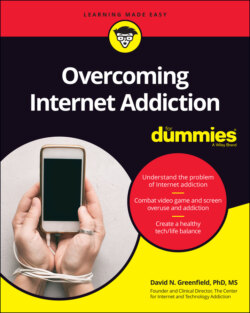Читать книгу Overcoming Internet Addiction For Dummies - David N. Greenfield - Страница 82
Understanding instant gratification
ОглавлениеThe Internet allows for a near-instant reflex, where a click or screen tap enables you to find just what you’re looking for. There is very little lag between the impulse to look for something, play a game, or respond to a notification and the act of doing it. Keep in mind that the shorter the time between clicking and viewing the content, the more addictive it becomes. The shortened lag also produces a sense of instant or near-instant gratification and reinforces your inability to delay gratification. What this ends up looking like is that you never really have to wait for anything. Everything is instantly experienced, from a whim to satisfaction.
Sometimes waiting can build our tolerance to address aspects of life that are not instantly satisfied or that require sustained attention and effort. At times we might even learn to endure boredom for a few short minutes, without reaching for a screen, but the Internet seems to facilitate the opposite.
Data seems to show that the ability of younger people to delay gratification and maintain sustained effort has waned over the last 25-plus years. Add to the equation that we’re carrying an Internet portal everywhere we go, and we can see how our smartphone erases the last vestiges of our willpower by allowing us to instantly satisfy every impulse. Every social media update or notification we receive becomes a trigger to pick up our phone and look. Every question, curiosity, or text we have becomes another glance at our phone. The problem is that it never ends, and any boundary between screen life and real-time life evaporates. There is no off button, no downtime to enjoy without the pull of our phones and the lure of that instant dopamine hit.
Did you know that the anticipation of finding or seeing something desirable or stimulating (dopamine-releasing) is stronger than the actual pleasure itself? In other words, the anticipation of seeing something you might like will produce even higher levels of dopamine. Just like in gambling, it’s the expectation or belief that you might win that is most intoxicating. So, if you post something on social media and see notifications come in, they will be more dopamine-elevating than looking at your phone and seeing that your post was liked or commented on. To your brain, being in the game is more powerful than winning the game — but winning also provides an additional secondary hit of dopamine.
Facebook uses this anticipation factor in the form of staggered posting of your received likes or comments, and then delivering them to you randomly to keep you looking at your page over and over.
